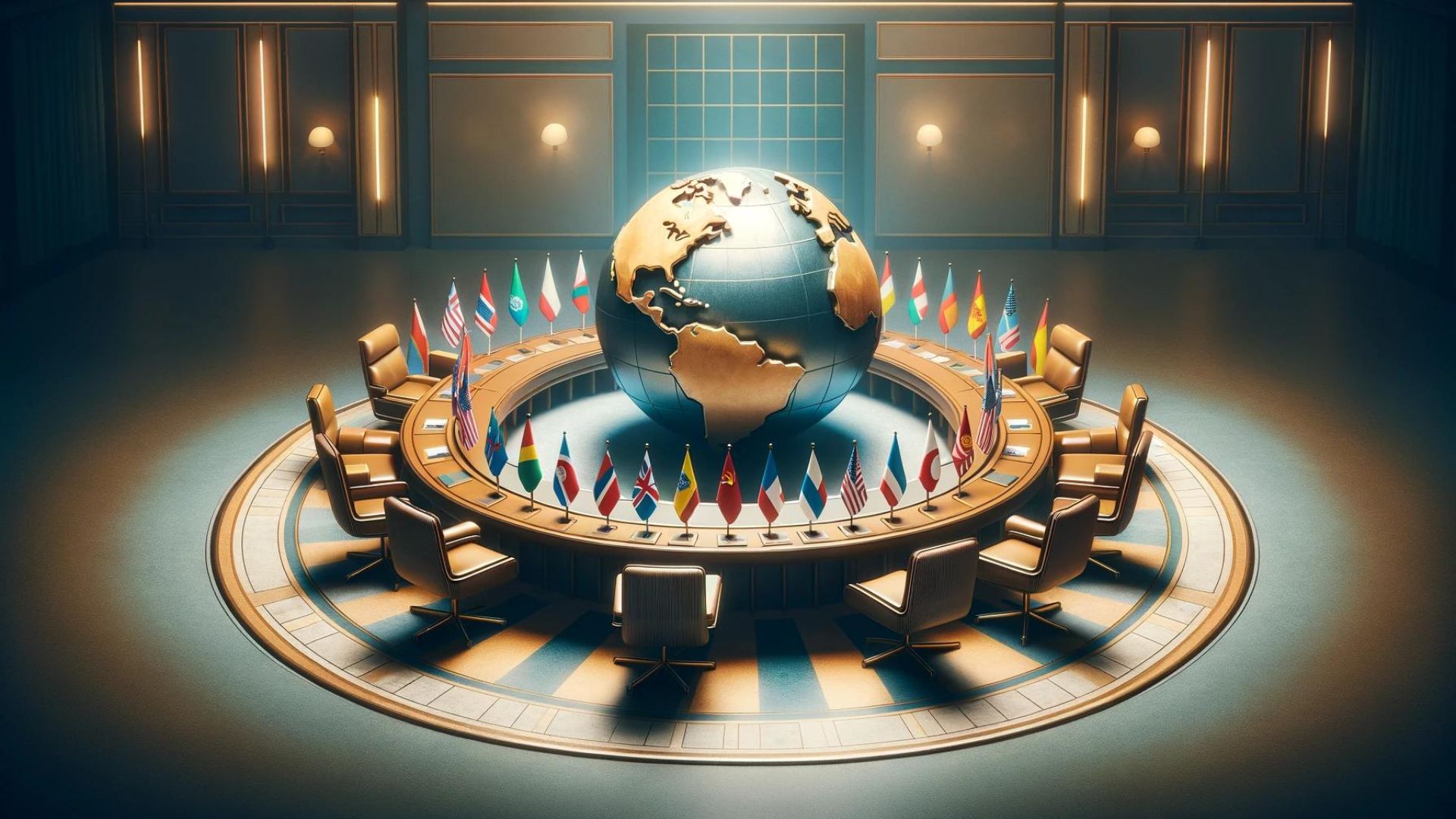The Helsinki Accords: A Beacon of Hope in a Frozen Landscape
Imagine a world divided, two superpowers locked in a chilling standoff, each armed to the teeth with nuclear weapons. This was the reality of the Cold War, a period of immense tension and the constant threat of global conflict. Yet, even amidst this icy landscape, a glimmer of hope emerged in the form of the Helsinki Accords.
In 1975, 35 nations, including the United States and the Soviet Union, gathered in Helsinki, Finland, to sign a seemingly improbable agreement. The Helsinki Accords were not a peace treaty, nor did they end the Cold War overnight. Instead, they represented a critical turning point, a recognition that dialogue and cooperation were essential, even between bitter rivals.
A Diplomatic Dance
The Accords were a complex tapestry of agreements, addressing issues ranging from security and economic cooperation to human rights and cultural exchange. While initially met with skepticism by some, the Accords proved to be a catalyst for change.
They established a framework for ongoing dialogue between East and West, fostering trust and understanding. The Accords also put a spotlight on human rights abuses in the Soviet bloc, giving a voice to dissidents and activists who had been silenced for years.
The Domino Effect of Peace
The Helsinki Accords did not magically erase decades of hostility, but they set in motion a series of events that ultimately contributed to the end of the Cold War. The increased communication and cultural exchange between East and West helped to break down stereotypes and misconceptions. The focus on human rights emboldened movements for political reform in the Soviet bloc.
The Accords also served as a model for future diplomatic efforts, demonstrating that even the most entrenched conflicts could be addressed through negotiation and compromise.
The Unlikely Triumph of Diplomacy
The Helsinki Accords remind us of several crucial truths:
- Peace is Always Possible: Even in the face of seemingly insurmountable odds, peace can be achieved through dialogue, diplomacy, and a willingness to find common ground.
- Small Steps Lead to Big Change: The Accords were not a grand solution, but a series of incremental steps that gradually built trust and cooperation.
- Human Rights Matter: The Accords’ emphasis on human rights empowered individuals and movements to challenge oppressive regimes and demand change.
Your Invitation to Action
You might be thinking, “The Cold War is over. What does this have to do with me?” The lessons of the Helsinki Accords are timeless. They remind us that even in the face of conflict and division, there is always the possibility of peace.
Start by promoting peace in your own life and communities. Engage in respectful dialogue with those who hold different views. Support organizations that work towards conflict resolution and human rights. Educate yourself about global issues and advocate for peaceful solutions.
Remember, peace is not a passive state; it’s an active choice that we make every day. By embracing the spirit of the Helsinki Accords, we can build a more peaceful and just world for ourselves and future generations.
Why Should You Care?
Understanding the Helsinki Accords is crucial because:
- Relevance to Current Events: The principles of diplomacy, negotiation, and human rights remain as important as ever in today’s complex geopolitical landscape. Learning from past successes (and failures) can inform current approaches to conflict resolution.
- Historical Significance: The Accords were a pivotal moment in the Cold War and shaped the course of international relations for decades. Understanding their impact helps us grasp the complexities of that era and its ongoing influence on the world today.
- Inspiration for Peacebuilding: The Accords demonstrate that even seemingly intractable conflicts can be addressed through dialogue and cooperation. This provides a powerful example and source of hope for peacebuilders around the world.
- Human Rights Advocacy: The Accords’ focus on human rights highlights their fundamental importance and the need for ongoing vigilance and advocacy to protect them.
Key Takeaways
- Diplomacy as a Tool: The Accords show the power of diplomacy and negotiation in easing tensions and fostering cooperation, even between adversaries.
- Incremental Progress: Peacebuilding is often a gradual process, requiring small steps and sustained effort to achieve meaningful results.
- Human Rights as a Foundation: The Accords underscored the importance of human rights as a cornerstone of international relations and a catalyst for political change.
- Hope Over Despair: Even in the darkest of times, the pursuit of peace is always worthwhile and can lead to unexpected breakthroughs.
Keywords & Definitions
- Helsinki Accords: A series of agreements signed in 1975 by 35 nations, addressing issues of security, cooperation, and human rights.
- Cold War: A period of political and military tension between the Western Bloc (led by the United States) and the Eastern Bloc (led by the Soviet Union) from the mid-20th century to the early 1990s.
- Diplomacy: The art and practice of conducting negotiations between nations for the purpose of resolving conflicts and maintaining peaceful relations.
- Détente: The easing of strained relations, especially in a political situation, often used to describe the period of improved relations between the U.S. and the Soviet Union in the 1970s.
- Human Rights: Basic rights and freedoms to which all human beings are entitled, such as the right to life, liberty, and freedom of expression.
- Soviet Bloc: The group of communist states in Eastern Europe under the influence of the Soviet Union during the Cold War.
- West: The group of democratic nations in Western Europe and North America, led by the United States, during the Cold War.
- Security: The state of being free from danger or threat, a key concern during the Cold War due to the risk of nuclear war.
- Cooperation: The process of working together to achieve a common goal, seen as essential for overcoming the divisions of the Cold War.
- Trust: Firm belief in the reliability, truth, ability, or strength of someone or something, essential for building relationships and resolving conflicts.
Frequently Asked Questions
- Did the Helsinki Accords have any immediate impact on the Cold War? While not immediately transformative, the Accords created a foundation for improved relations and increased dialogue between East and West. This gradually led to greater cooperation and ultimately contributed to the end of the Cold War.
- Were there any criticisms of the Helsinki Accords? Some Western critics felt the Accords legitimized Soviet control over Eastern Europe and didn’t go far enough in addressing human rights violations. Others argued that the Accords were a naive attempt at peace with a totalitarian regime.
- What is the legacy of the Helsinki Accords today? The Accords remain a significant landmark in international relations, demonstrating the value of diplomacy and the importance of human rights. They also serve as a reminder that even the most entrenched conflicts can be addressed through dialogue and cooperation.
Myth Buster
- Myth: The Helsinki Accords were a failure because the Cold War continued for years afterward.
- Reality: The Accords were not intended to end the Cold War immediately but to establish a framework for dialogue and cooperation. They played a crucial role in thawing relations and ultimately contributed to the peaceful resolution of the Cold War.
Let’s Talk
- What are some current conflicts where the principles of the Helsinki Accords could be applied?
- How can we ensure that human rights remain a central focus in international relations and diplomacy?
- In your opinion, what are the most important lessons we can learn from the Helsinki Accords for peacebuilding in the 21st century?
Please share your thoughts and insights in the comments section below. Let’s continue this important conversation about the power of diplomacy, the importance of human rights, and the enduring pursuit of peace.










0 Comments